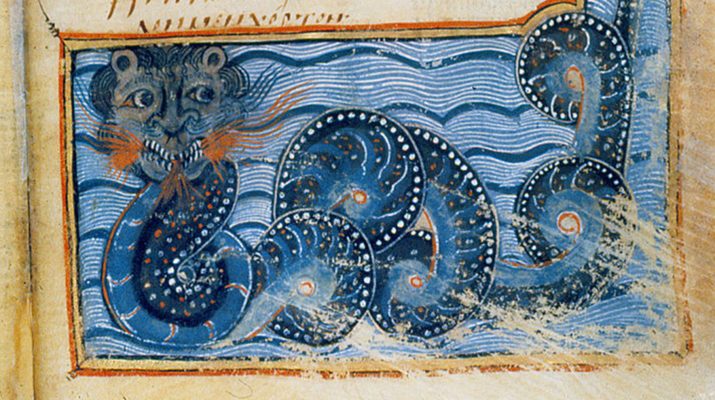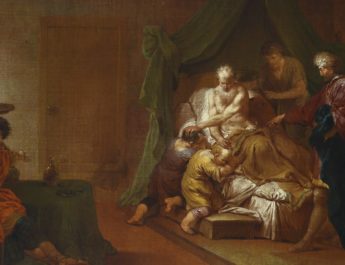Psalm 89:1-8
Holy Name of Jesus – A Women’s Lectionary
A MaskilI of EthanII the Ezrahite.III
I “Maskil” = maskiyl. 13x in OT. From sakal (to consider or be prudent; to instruct, be an expert; dealing prudently, which implies success and prospering; can mean laying cross-wise). This is maskil or maschil. It is a poem used for instruction.
II “Ethan” = Ethan. 8x in OT. From the same as ethan (root might mean to continue; mighty, strong, ever-flowing, enduring, or permanence). This is Ethan, a name meaning “permanence” or “permanent” or “perpetuity” or “perennial” or “firmness.” See https://www.abarim-publications.com/Meaning/Ethan.html
III “Ezrahite” = Ezrachi. 3x n OT. From zarach (to rise, shine, or dawn; can also describe symptoms of leprosy). This is Ezrahite, one whose ancestor is Zerah. It may mean “born of the native” or “son of dawn” or “sprung up” or “of the family of Zerah.” See https://www.abarim-publications.com/Meaning/Ezrahite.html
1 I will sing of your steadfast love,IV O Lord,V forever;VI
IV “steadfast love” = chesed. From chasad (being good, kind, merciful; may mean bowing one’s neck as is done in the presence of an equal for courtesy’s sake; so, if one in a superior position is treating you like an equal, that is what is captured here). This is favor, goodness, kindness, loving kindness, pity, reproach, or a good deed. When done by God to humanity, this is mercy/loving kindness. When done by humanity to God, it is piety.
V “Lord” = YHVH. From havah (to be, become) or hayah (to come to pass, become, be). This is the name of the God of Israel, the self-existent and eternal one, the tetragrammaton. This pronunciation has been lost to time so “Lord” is generally used in its place.
VI “forever” = olam. This is a long scope of time whether in the past (antiquity, ancient time) or in the future (eternal, everlasting).
with my mouthVII I will proclaimVIII your faithfulnessIX to all generations.X
VII “mouth” = peh. This is mouth in a literal or figurative sense. So, more literally, it can be beak or jaws. More figuratively, it refers to speech, commands, or promises.
VIII “proclaim” = yada. This is to know, acknowledge, advise, answer, be aware, be acquainted with. Properly, this is to figure something out by seeing. It includes ideas of observation, recognition, and care about something. It can be used causatively for instruction, designation, and punishment.
IX “faithfulness” = emunah. From aman (to believe, endure, fulfill, confirm, support, be faithful, put one’s trust in, be steadfast. Figuratively, this is to be firm, steadfast, or faithful, trusting, believing, being permanent, morally solid). This word is literally firmness, but figuratively fidelity, faithfulness, honesty, responsibility, trust, truth, steadfastness. This word shares a root with the word “Amen.”
X “to all generations” = dor + dor. Literally, “from generation and generation.” From dur (to move in a circle, which implies living somewhere or remaining there; it can also be the sense of piling or heaping up). This is a revolution of time, which is to say, an age or generation. It can also be a dwelling or one’s posterity.
2 I declare that your steadfast love is establishedXI forever;
your faithfulness is as firmXII as the heavens.XIII
XI “established” = banah. This is to build, make, set up, restore, repair, or obtain children. It is to build literally or figuratively.
XII “is as firm” = kun. Properly, this means in a perpendicular position. So, it is set up in a literal sense – establish, fix, fasten, prepare. In a figurative sense, it is certainty, to be firm, faithfulness, render sure or prosperous.
XIII “heavens” = shamayim. Root may mean being lofty. This is sky, the air, or heaven. It is in a dual noun form so this might refer to the part of the sky where the clouds move on the one hand and the part beyond that where the sun, moon, and stars are on the other hand.
3 You said, “I have madeXIV a covenantXV with my chosenXVI one,
XIV “made” = karat. This is to cut down, cut off, or make a covenant (idiom for making a covenant is “to cut a covenant”). It can also mean to destroy, fail, or consume.
XV “covenant” = berit. Perhaps from barah (to eat, choose, make clear); perhaps from bar (grain, wheat); from bara (to select, purify, cleanse, test, brighten, polish). This is a compact, covenant, alliance, treaty, or league.
XVI “chosen” = bachir. From bachar (to choose, appoint, try, excellent). This is chosen or choice. So, it implies excellence.
I have swornXVII to my servantXVIII David:XIX
XVII “sworn” = shaba. Perhaps from sheba (seven – the number of perfection/sacred fullness). This is to swear, curse, vow, make a covenant. Properly, it can mean to be complete. This is to seven oneself – as in affirming something so strongly it is as though it were said seven times.
XVIII “servant” = ebed. From abad (to work, serve, compel; any kind of work; used causatively, can mean to enslave or keep in bondage). This is a servant, slave, or bondservant.
XIX “David” = David. From the same as dod (beloved, love, uncle); the root may mean to boil, which is used figuratively to describe love. So, this implies someone you love such as a friend, a lover, or a close family member like an uncle. David’s name likely means something like “beloved one.”
4 ‘I will establishXX your descendantsXXI forever,XXII
and buildXXIII your throneXXIV for all generations.’” SelahXXV
XX “establish” = kun. Same as “is as firm” in v2. See note XII above.
XXI “descendants” = zera. From zara (to sow or scatter seed; conceive or yield). This is seed or sowing. It can, thus, mean a fruit, plant, sowing time, child, offspring, or posterity.
XXII “forever” = ad + olam. Literally, “even to forever.” Olam is the same as “forever” in v1. See note VI above.
XXIII “build” = banah. Same as “established” in v2. See note XI above.
XXIV “throne” = kisse. From the same as kese (full moon); perhaps from kasah (to cover, conceal, overwhelm; to cover as clothes do or to hide a secret). This is throne – a seat that is covered or has a canopy. Thus, it is a seat that conveys authority.
XXV “Selah” = selah. From salal (to lift up, build, pile, extol, exalt; can also be used for opposing as a dam holds back water). This is to lift up or exalt. Also, “selah” in the psalms where its precise meaning is uncertain. It could be a pause in the music, a moment of silence. It could signal a change in the service or mean something akin to amen.
5 Let the heavens praiseXXVI your wonders,XXVII O Lord,
XXVIIIyour faithfulness in the assemblyXXIX of the holy ones.XXX
XXVI “praise” = yadah. From yad (hand). This is to throw one’s hands into the air in a gesture of praise. So, it is to praise, give thanks, or make a confession.
XXVII “wonders” = pele. 13x in OT. This is a wonder, marvelous thing, or a miracle.
XXVIII {untranslated} = aph. This is also, furthermore, even.
XXIX “assembly” = qahal. This is an assembly, congregation, or multitude.
XXX “holy ones” = qadosh. From qodesh (set apart and so sacred; God is different from us and so God is holy/set apart; things we dedicate to God’s service are set apart for God and so they, too, are holy); related to qadash (set apart, consecrated, hallowed, sanctified; something or someone set apart for a holy purpose or use – ceremonially or morally clean). This is sacred or holy in a ritual or moral sense. As a noun, it refers to a holy one (like a saint or angel), a holy place (the sanctuary), or God (the Holy One).
6 For who in the skiesXXXI can be comparedXXXII to the Lord?
Who among the heavenlyXXXIII beingsXXXIV is likeXXXV the Lord,
XXXI “skies” = shachaq. From shachaq (to rub off, wear away, pulverize). This is powder, dust, vapor. It can also refer to the sky or a cloud.
XXXII “compared” = arak. This is to arrange by setting in a row. It can also mean to set a battle, estimate, put in order, or compare.
XXXIII “heavenly” = el. This can refer to God of a god. It can also refer to power, an idol, or one that is powerful.
XXXIV “beings” = ben. Related to “established” in v2. From banah (see note XI above). This is son, age, child. It is son in a literal or figurative sense.
XXXV “is like” = damah. This is to be like, resemble, devise. It can be to think using analogies.
7 a GodXXXVI fearedXXXVII in the councilXXXVIII of the holy ones,
XXXVI “God” = El. Same as “heavenly” in v6. See note XXXIII above.
XXXVII “feared” = arats. 15x in OT. This is to fear, terrify, be in awe, oppress, make one tremble, harass, shock.
XXXVIII “council” = sod. Perhaps from yasad (to establish, appoint, instruct; to set in a literal or figurative sense; also, to sit down together and so to consult or take counsel). This is a session, counsel, or assembly. It can also mean a consultation.
greatXXXIX and awesomeXL above allXLI that are aroundXLII him?
XXXIX “great” = rab. From rabab (increasing in any aspect whether quantity, authority, size, quality, greatness, etc.). This is abundance, many, elder, exceedingly, great. It refers to abundance of amount, rank, or status.
XL “awesome” = yare. This is to fear, be afraid, dreadful. It can also refer to fearful reverence – to fear in a moral sense is to say to revere, respect.
XLI “all” = kol. From kalal (to complete). This is all or every.
XLII “around” = sabib. From sabab (turning around, going around; to surround, cast, walk, fetch; to revolve or border in a literal or figurative sense). This is a circuit or a circle. It could refer to an environment, one’s neighbors, or a circular path round about.
8 O LordXLIII GodXLIV of hosts,XLV
who is as mightyXLVI as you, O Lord?
Your faithfulness surroundsXLVII you.
XLIII “Lord” = Yah. Related to “Lord” In v1. From YHVH (see note V above). This is Lord or God – a shortened form of God’s most holy name.
XLIV “God” = Elohim. Related to “heavenly” in v6. From eloah (God, a god); from el (see note XXXVI above). This is most commonly used as a name for God. Technically, it’s in the plural, i.e. gods. It can also mean great, mighty, judge, or ruler.
XLV “hosts” = tsaba. From tsaba (to wage war, serve, assemble, fight, perform, muster, wait on). This is a large group of persons (used figuratively for a group of things). It implies a campaign literally as with army, war, warfare, battle, company, soldiers. Can also be used figuratively for hardship or for worship.
XLVI “mighty” = chasin. 1x in OT. From the same as chosen (wealth, strength); from chasan (to hoard, store, be compact). This is firm or strong.
XLVII “surrounds” = sabib. Same as “around” in v7. See note XLII above.
Image credit: “Leviathan” from Codex Gr. 749, Folio 238; from 850-900 CE.




